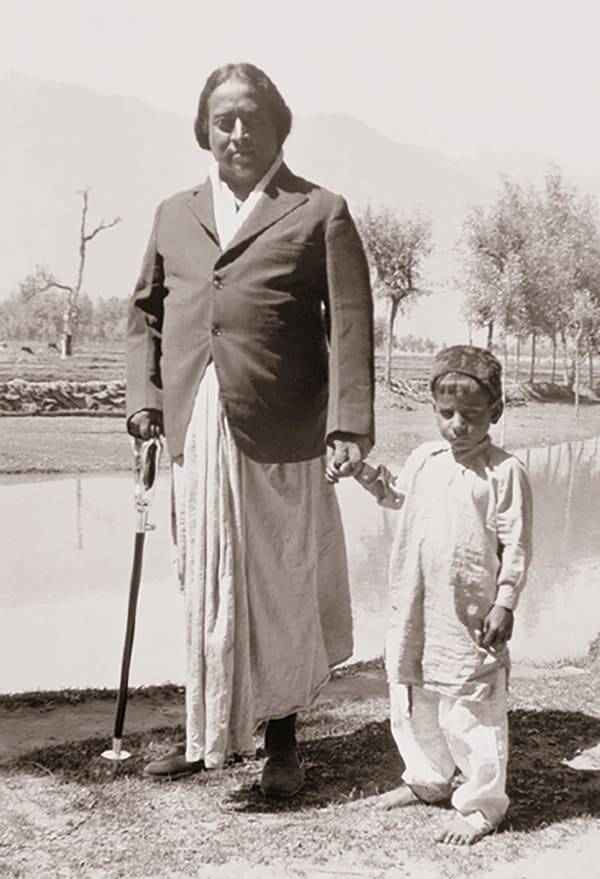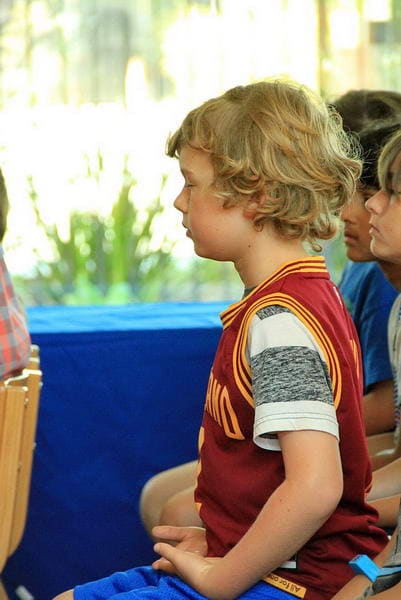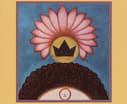Paramahansa Yogananda on Parenting
In this article, Sri Paramahansa Yogananda’s views on parenting a child, a teen or a youth are shared. All these excerpts are from Self-Realization Fellowship and Yogoda Satsanga Society’s publications. If you find that any of His instructions on parenting are missing, please do share them in the comments.

Train your children
In this modern age, everybody needs to be trained, because they have so much temptation placed before them. All parents should train their children to develop a taste for better habits. Consider more seriously the responsibility of guiding your children. Many bad habits are imposed on them in the environment of the schools! Influenced by other children, they feel they have no choice, if someone doesn’t join the crowd and smoke or drink, he is considered a sissy. Youngsters thus succumb to all kinds of wrong behaviour. I know so many boys and girls who have taken to drink and smoking, and even worse. Those young children that I have taken into the ashram for training I consider my own, and my heart goes out with them when they go into the environment of the public school. I tell them, “Don’t be a doormat. Dare to be different, and to say no when others try to persuade you into wrong ways.”
The very fabric of your family life is being destroyed because of the lack of moral and spiritual education at home as well as in the schools. You must do your part to teach your children to resist evil… When I was a child in India, we were given strict moral and spiritual culture at home. Mother used to tell me, “Never desire wealth.” I asked why, and she said, “It will make you a slave.” We were never permitted even to utter the word “wine,” because drinking was recognized as an evil habit. Reason with your children. Remind them that by developing wrong habits they are wading into the cesspool of error. If they should go on in that way, it will be too late for them to come out of it. All the joy of life will be over for them.
~ The Divine Romance, “How to free yourself from bad habits“
It is best to simplify life. I have seen saints in India who eat hardly anything and live under the most rigorous conditions; yet they have wonderfully strong bodies, far better than those of the average well-fed, well-cared-for American. They have trained their minds not to be dependent on externals for health and contentment.
The world trains our minds in a different way. It gets us accustomed to too many things, and then we think we can’t be happy without them. Make your life more simple. And simplify the lives of your children as well. If you don’t do it, life’s experiences will teach them through bitter disillusionment.
Self-Realization [Yogoda Satsanga] is a philosophy of living: right meditation, right thinking, and right living. Bring up your children in this philosophy. Don’t pamper them, or teach them by wrong example to cater to their bodies and harmful desires, give them good training. Why enslave them in delusion? Give them true freedom by keeping their lives simple and cultivating in them inner peace and happiness. Do the same with your own life.
~ “A new look at origin and nature of cosmic creation”, The Divine Romance

If you have children, train them in the right ideals to help bring them back to God. Every one of you has a tremendous work to do: Convert others to God by your spiritual example. To help others find God is the highest gift you can give.
~ “Preparing for your next incarnation“, Journey to Self-realization
All those who come to me for training I place in certain situations to see how their minds and feelings will react. If they respond adversely I try to correct them; but I don’t do this unless the person has asked to be corrected, and has given me the authority and permission to guide him.
~ “How to read character“, Man’s Eternal Quest
“From childhood, there should be emphasis on the importance of educating our young people in developing their moral and spiritual consciousness. Among the first lessons is to learn how to introspect to keep a watchful eye on the correctness of one’s own thoughts and behavior, and to avoid the divisive habit of criticizing & judging others. One should criticize & change oneself first.”
Teach them to meditate

Ever strive to establish the divine consciousness in your children by teaching them to meditate, that they be not tempted to play with the fire of delusive counterfeit joys.
~ “True experience of spiritual ecstasy“, Man’s Eternal Quest

How to teach a child
A child should be taught by example, by actions, not words alone. Once or twice is enough to tell him what quality you wish him to cultivate, and then mentally hold the thought, not giving up until it is an accomplished fact. Think up new and suitable methods to engage his interest and to encourage good qualities. Teach him with love and reason, never with anger or unreasonableness. A change of environment and company should be made, if necessary. Let him understand that you have his best interest at heart.
~Psychological chart
Character building should be taught in schools and colleges, but fathers should realize that example is more important than schooling. One should not tell his children, “Do not do as I do, but do as I say.” If you do not want a child to smoke, you yourself should not smoke. If you want a child to be mild and noble of speech, you should not talk to your wife impatiently, because the child notices your example. Be kind in word and thought because it is the Heavenly Father who has taken your form to look after the child.
~ “God’s nature in the mother and the father“, Man’s Eternal Quest
Habit formation
Just as one cannot remould a lump of clay which has been hardend by fire, so also it is very difficult to change the child’s tendencies after they have been stubborn habits.
But in spite of this difficulty, it should be clearly remembered that human beings are not like material things, whose nature cannot be changed. No matter what nature they might have inherited or created by their own actions, it can be changed – not by mere wishing, but by acting in the right way repeatedly and patiently for some length of time. Human nature, even when hardened into rocks of habit, still retains its inherent plasticity, which reappears under the fire of constant discipline.
~ Psychological Chart
If there were no possibility of change inside, wherein are sheltered the seeds of what we are to become, we would be unable to alter the unknown part of our nature. But we do have the opportunity to influence what we become. Early training has much to do with stimulating or paralyzing the growth of this unknown part of our self. As the seeds send forth their messenger- sprouts, we should look after the fertilizing, weeding, loosening of the ground, watering, and protective fencing. And we must also do pruning and uprooting of undesirable growth. The fruits of the garden of our life will be large, small, or medium-sized, healthy or diseased, according to how we attend to their rearing. That much lies within the scope of human freedom. If we turn our free-choice activities to the best use, the outer result will be desirable, and there will also be new and better seeds gathered in the unknown part of our nature, and these will in turn determine the future known expression of life.
~ “The known and the unknown“, The Divine Romance
We must begin with the children as well as with the adults. The plastic mind of the child can be molded into any shape with the cooperation of self-disciplined, reformed adults. Desired habits can easily be created in children because the will to perform is mostly free except for a few innate tendencies. Adults have to battle and expel old habits in order to lodge new good ones. But all habits, whether in children or adults, must be cultivated through the medium of spontaneous willingness. In training children in a balanced life or in habits of paying equal attention to the earning of money and to the acquisition of spiritual happiness, the time and method of training has to be considered.
Many psychologists say that the later periods of life are but the repetitions of the training one received between the ages of two to ten or fifteen.
Spiritual sermons inspire the minds of children to better action, but that is all. Actual practical discipline is necessary for roasting the seeds of past-life prenatal habits lodged in the subconscious and superconscious minds. This can only be done by directing inwardly the cauterizing power of the electricity of concentration.
Children ought to be brought up with a spiritual ambition to make money only for the sake of service. Modern children are mostly reared in a wrong atmosphere where money-making is the goal
~ “Business, balance and inner peace“, Journey to Self-realization

Start early
Patanjali’s aphorisms show that these laws of righteousness are not for the church only. Politics, social life, moral life, spiritual life—all should be governed by the divine laws. I have analysed each of the eternal commandments of religion. They are the supreme laws of happiness.
The principles of right behaviour, and the whys of right conduct should be taught in the home, in the schools, and in Sunday schools, to guide children’s lives from the very beginning. Our saints in India say that children should be started on the path of religion, the path of yoga, from the age of three, because habits begin to form then.
~ “The Why and How of religion“, The Divine Romance
One reason why the modern generation is so restless is because children are not nurtured in spiritual ideals and practices. Instead, to get them out of the house they are sent off to the movies or other restless activities following a short, uninteresting Sunday School class in the morning. Spirituality needs to he encouraged (not forced as a discipline) from an early age. The example should be set in every home.
~ Discourse 32, Second Coming of Christ
Teach physical and mental discipline
But what poor training the world gives us you can well understand. Either the father is mad and takes it out on the children or the mother scolds without cause. What an example for the young! What a picture to place before them!
It is better not to produce children unless you are willing to give them proper training. By withholding the right kind of discipline you make them miserable all their lives. They acquire habits that prevent them from being themselves, their true Selves.
~ “How feelings mask the soul”, The Divine Romance
All the fundamental habits of a child are formed between the ages of three and seven. Good environment will help to guide his development, but to change (if desirable) the salient tendencies of a child, special training is required. In my school in Ranchi, India, I gave the boys rigid training of the body. They fasted often, and slept on a blanket on the floor, never using pillows. Sometimes they meditated for hours. To help children by rigid discipline to be free from the tyranny of the body is to confer on them a lifelong blessing. One of the schoolboys sat for twelve hours in meditation without winking his eyes. If you had such poise, how much happier you would be! How much more peace you would have! The greatest training lies in scientific, balanced discipline of the body, mind, and spirit. And in that lies the heart of fasting.
~ “The physical and spiritual rewards of fasting“, Man’s Eternal Quest

A pampered child suffers greatly over even a little hurt; a Spartan-trained child may hardly wince at serious injury.
In this respect the system of training given in India under great masters is entirely different from that given in Western schools. Indian masters train their students to free themselves completely from slavery to the body and its sensations. The comforts and conveniences developed in the West encourage pampering the body; as a result, little or no effort is made to cultivate mental strength. In India we are trained from childhood to nip in the bud the dictates of sensations. In my school at Ranchi we had the children sleep on little mats on the hard floor, and they grew healthier. Westerners are conditioned to too many external necessities in order to sleep well or be at peace. In India we were taught to sit on the hot sand in meditation. Gradually we could sit in the heat all day long; and in the cold, likewise. As a result of this training I found such mental strength that nothing can affect or disturb my consciousness. When I disconnect my mind from the sense telephones, I am not bothered by anything.
~ “Even mindedness in a world of change”, Man’s Eternal Quest
Start by not catering to likes and dislikes. And give that same training to your children. You spoil your children when you say, “What would you like to eat? Do you care for spinach? You don’t have to eat it if you don’t like it.” By such indulgence you make your child a slave of feeling.
~ “How feelings mask the soul”, The Divine Romance
Teach Spiritual Qualities
My mother used to say, when giving some special treat of food to me, “Share this with somebody else.” Initially, my reaction was that she was trying to give me less. But immediately I began to picture in my mind, “Well, if I like this food so much, maybe somebody else would also like it.” So I decided I should share. Then came the thought, “If I share with everybody, there will be nothing at all left for me.” That began to puzzle me. But my experience was that if I shared with others, then I enjoyed more—the joy received from sharing was even greater than the joy I got from the thing I had shared.
“Spiritual selfishness versus evil selfishness”, Journey to Self-realization
I used to tell the students in my school in India that they must not only speak truth and expect forgiveness, but that they must speak truth and willingly accept any unpleasant consequences.
~ “The art of getting along in this world“, Journey to Self-realization

Keeping right company
I like to be with people in worthwhile activities and uplifting exchanges of friendship, but not in anything that is a source of inharmony. Keep your distance from whatever or whoever creates inharmony.
I wish these truths were taught in childhood. They should be dinned into the ears of your children. Lessons learned early in life make lasting impressions.
~ “The art of getting along in this world“, Journey to Self-realization
Do not give too much money
Provide for your family, but never spoil your children with too much money.
~ “Acquiring attunement with the source of success“, Journey to Self-realization
The real freedom
In the West many people believe in freedom of a different kind—I call it whim freedom. Because of a mistaken conception of the real nature of freedom, some parents make their children habit-slaves for life by indiscriminately giving in to their desires. The child grows up thinking that so long as his desires are satisfied he will be happy, and that the purpose of life is to satisfy desires. Later he realizes that he has been misled; the world outside is much different from what he has seen at home. To satisfy every whim is not so easy in the world!
~ “Creating and destroying habits at will“, Man’s Eternal Quest
Parents should try to equip their children with firm will and discrimination, so that they can make their way in the world and still remain apart from its bad habits. Teach children how to be really free. Don’t let them become slaves to the body and to undesirable habits. It is good to train a child in regularity of daily habits, but he should be trained also in even-mindedness: if he gets to sleep on time, all right; if not, all right. If he has his dinner on time, fine; if he cannot eat on time, fine. Children should be taught to respect the rights of others; but to be free of habit slavery to anything or anyone.
~ “Creating and destroying habits at will“, Man’s Eternal Quest
Bad mental habits in early life
When from the very beginning of life a person displays extraordinary tantrums of anger, fear, jealousy—or any other of the aforementioned characteristics—then one may know that he has acquired those abnormal mental habits in a previous existence.
Parents who notice any such evil psychological tendencies in their child, even in its infancy, should get busy and take some steps to prevent the child from becoming a psychological alcoholic; if possible, by placing him in another environment under the good care of spiritual teachers.
Through continued good company and proper environment for many years, a mental alcoholic may become free from the octopus grip of the inborn evil. While the mental alcoholic is receiving thoughtful care in a good environment, the evil consequences of his bad habits should be explained to him, and he should be encouraged to reason with himself about them and to make a distinct effort not to display them under any circumstances. Each indulgence in a prenatally acquired mental habit makes it stronger and stronger, until the possessor becomes literally a slave to it.
~ “Curing mental alcoholics”, Man’s Eternal Quest
If children are exposed to an evil environment while their minds are in a plastic state, they will develop wrong habits that, unchecked, may lead to chronic mental alcoholism. Parents who notice a sudden change in a child—perhaps a calm- natured boy suddenly turns into a repeatedly angry boy— should immediately take care of this. The causes of his frustrations should be determined and removed, and new avenues for constructive use of his energies sought.
~ “Curing mental alcoholics”, Man’s Eternal Quest
Sometimes a good man’s child is lacking in truthfulness and good habits. Certainly the child has had every opportunity to learn to be good; yet the moment he becomes old enough to start using his own will, he gets into all kinds of mischief. Why? Usually in such cases the child’s nature from past lives is karmically inclined toward wrong thinking and habits. Through his family training in this life he learns to perform good actions; but they are only superimposed on his real nature. Because his will is controlled only by mechanical good habits, rather than by soul wisdom and true understanding, he readily succumbs to temptations when he is free of the good influence of the family.
~ “Developing dynamic will”, Man’s Eternal Quest
The behaviour of even the smallest child reveals certain characteristics of past lives. Some children have terrible temper tantrums, others are moody. God did not make them that way. Unfulfilled desires of past lives fashioned those psychological tendencies, and, because of them, the soul, even though made in the image of God, appears as something different.
~ “The desire that satisfies all desires“, Man’s Eternal Quest
Never nurture fear
Parents should never nurture fear in their children. The threat of ghosts and scary stories are not the impetus you should use to correct a child’s behavior. You may be impairing the child’s outlook on life. Intimidation is harmful, such as, “If you don’t behave, the boogey man will get you,” or to threaten shutting the child in a dark closet. Fear of darkness and of scary ghosts go together. To rouse such fright in a child is terrible; it creates a nervousness that peralyzes the natural progress of the soul.
~ Self-Realization Magazine, Destroying the Consciousness of Fear, Spring 2006
From childhood to youth
When the baby grows into a little child he is surrounded by the influences of the mother’s and father’s guiding will, and the wills of other relatives as well. Each one wants him to be something different, and his naughty friends want him to be still something else!
The child has a great many struggles with these conflicting pressures. This is a miserable life, so it is good to give your children a little freedom. Young ones who are given too much freedom, however, may later lament, “I wish I had been told long ago not to do this, then I would not be what I am today.” Think of all the struggles, physiological and mental, one has to go through until he becomes a youth. At that time of life the senses become more active and the youth has a great inner battle with himself. The struggle with the senses is a tremendous contest. To conquer in this adventure of youth, to go victoriously through this thrill of living, is a great experience.
~ “Man’s greatest adventure”, Man’s Eternal Quest
Man progresses from the physiological will of infancy to the unthinking will of childhood. That is when he is used to obeying his mother, doing whatever she tells him to do. After unthinking will comes blind will; he gets away from the mother’s will and begins to feel his own will power. This comes in youth. He tests his own will and begins to use it to get what he sets his heart on.
~ “Developing dynamic will”, Man’s Eternal Quest
Allow the child to reason
Dogmatic religionists are convinced that if you do not believe in a certain way you are doomed. Science does not teach you in that way; it proves its points. And true religion satisfies the demands of your soul, not by words but by proof. I wanted never to be so dogmatic that I would stop using my reason and common sense. When I met my guru, Sri Yukteswar, he said: “Many teachers will tell you to believe; then they put out your eyes of reason and instruct you to follow only their logic. But I want you to keep your eyes of reason open; in addition, I will open in you another eye, the eye of wisdom.”* Sri Yukteswarji gave me a teaching whose truth I could realize for myself. That is why I followed this path. No one can shake me from it.
~ “Three paths to cosmic consciousness”, Man’s Eternal Quest
Never talk against one another to the children
Fathers and mothers should never talk against one another to the children. They should keep their troubles completely to themselves. My parents had that self-control; they were really like gods.
~ “How to be more likeable”, Man’s Eternal Quest
Educate about sex
Attraction between man and woman should come from the soul. Those who have sex control and do not flaunt themselves as sex symbols have a much better chance of attracting the right kind of mate. So many young girls have come to me and complained that the boys want sex first or they won’t take them out. Sex experience is ruinous to youthful lives. In India, young people never touch or kiss until they are married. Love comes first. That must be the ideal.
~ “How to cultivate divine love”, The Divine Romance
Adults should learn by their own and society’s mistakes and help children to understand and observe the spiritual purpose of marriage and the creative sex force. They are taught mathematics, history, literacy, but academic education does not give them the art and science of discriminative behavior and self-control of sex. That should be taught in the schools everywhere and exemplified in the home. Out of such training and influences, ideal people will come.
~ Discourse 62, Second Coming of Christ
The attitude of parents towards their children
Each mother should remember that the divine unconditional love is passing through her and she is blessed. She should realize that it is not her own love she gives, but the love of the Mother Divine in her. She should be proud of her children, but should not limit herself by bestowing love only on her own sons and daughters. A mother should give divine unconditional love to all. This is my message for you today.
~ “God’s nature in the mother and the father”, Man’s Eternal Quest
A father should remember he is not just a human parent; he is a representative of the Heavenly Father. To that Cosmic Father I pay tribute. It is He who is behind all fathers. Each father should therefore realize that he has a responsibility to behave properly, for the transparent light of Spirit cannot flow through him if his mind is darkened with delusion and erroneous thoughts. He must keep himself pure, for it is through him and through all other fathers that the Heavenly Father looks after the children of earth.
A human father’s body and mind ought to be a temple of the Divine Father. As an instrument of the Divine Being, the father plays his greatest creative role when he implants in his children thoughts that will lead to God-realization.
To produce offspring is not a unique accomplishment; the animals do that. But to produce children on the plane of divine love and in a spiritual consciousness is an important achievement. Even animals may be bred to order; yet many human children are born out of passion and accident, emotion and evil. How can they be pure and perfect? The perpetrators of thefts and other crimes are usually children who were born out of passion, although sometimes there is a good soul here and there.
~ “God’s nature in the mother and the father”, Man’s Eternal Quest
Parents so easily become blind to the faults in their offspring! If you can’t see your child’s faults, there is something wrong with you love. Parents should learn to love their children unconditionally, without allowing love to blind them to errors in a child’s action or thinking. They should love their child in spite of any misdeed, but should not support him in his error. Help your children to extricate themselves from the pitfalls of evil, rather then drive them farther down by supporting them in their wrongdoing. They won’t return any love to you for that misguided indulgent love.
~ “Is God a father or a mother”, Man’s Eternal Quest

The father wants to govern the child by reason, the mother, by feeling.
The mother says, “Teach him by love.” Sometimes a great deal of love is good; but if you give too much sweetness, and that only, you may spoil the child. Sometimes a little strictness is good, but severe punishment for errors only drives a child to greater error. This is why the two aspects of God must be manifested through the parents in the upbringing of the child; both are necessary for its ultimate welfare. Every father should strive to temper his reason with love, and every mother to temper her love with reason.
When I think of my guru, Sri Yukteswarji, I see in him the sternness of a father and the kindness of a mother, without the weakness or blindness of either. Every father and every mother is potentially endowed with both the fatherly wisdom and the motherly tenderness of God. They have to perfect these endowments. Parents so easily become blind to the faults in their offspring! If you can’t see your child’s faults, there is something wrong with you love. Parents should learn to love their children unconditionally, without allowing love to blind them to errors in a child’s action or thinking. They should love their child in spite of any misdeed, but should not support him in his error. Help you children to extricate themselves from the pitfalls of evil, rather then drive them farther down by supporting them in their wrongdoing. They won’t return any love to you for that misguided indulgent love.
~ “Is God a father or a mother”, Man’s Eternal Quest
“How to Live” curriculum
Published in East – West magazine in 1925, and later on in “Man’s Eternal Life” and also in the SRF YSS lessons, “How to Live” curriculum is a part of the popular article “The Balanced Life”. It lists the constituents of a “How to live” education program.
Psychological Chart
“Psychological Chart” is an out-of-print document written by Sri Paramahansa Yogananda and published for the first time in 1925. Yoganandaji instructed:
This Chart will greatly help parents to properly bring up their children, in an all-around way, if it is applied during their early life, when different actions and environments have not left indelible hardened habit-impressions on them.
SRF YSS lessons
You can find more guidance from Sri Paramahansa Yogananda on this topic, in the following SRF / YSS lessons:
-
Relation between parents and children (YSS Old Lesson 153*)
-
Success Through Will Power (YSS Old Lesson 143*)
-
Scientific Techniques and Principles: Quickening Human Evolution (YSS Old Lesson 123*)
*SRF lesson numbers are likely to be different. If you have SRF lessons, I request you to share the corresponding SRF lesson numbers in the comments.